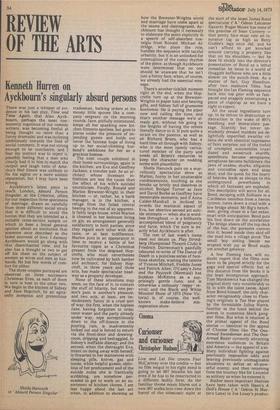Kenneth Hurren on Ayekbouni's singularly absurd persons
There was just a whisper of evidence in his last play, Time and Time Again, that Alan Ayckbourn, perhaps the most consistently ingenious of our comedy writers, was becoming fretful at being thought no more than a funny dramatist and was inclining ambitiously towards the field of social comment. It was not strong enough to be conclusive, and I fear my instinct was to reject it, possibly feeling that a man who clearly had it in him to match the output and laugh ratio of America's Neil Simon was unlikely to fix his sights on a more solemn reputation, but I may have been wrong.
Ayckbourn's latest piece to reach London, Absurd Person Singular, at the Criterion, offers for our inspection three specimens of marriage, drawn so carefully from three different social strata that it is difficult to avoid the notion that they are intended as a suitable cross-section sample on which to base a broad general opinion about an institution that someone once described as the faded souvenir of love. I daresay Ayckbourn would go along with that disenchanted view, and he also has a thought or two to get off his chest on the subject of women as wives and men as husbands. He has few words of comfort for either.
The three couples portrayed are observed on three successive Christmas Eves, as each of them in turn is host to the other two. We begin in the kitchen of Sidney and Jane Hoperoft, he an agitatedly pompous and pretentious tradesman, barking orders at his mousy little spouse like a company sergeant on the morning rounds. Jane, pitifully intimidated, keeps all her spanking new kitchen fitments spotless, but goes to pieces under the pressure of impending guests and holds out never the faintest hope of living up to her social-climbing husband's ambitions for her as a gracious hostess.
The next couple exhibited in their home surroundings, again in the kitchen, are Eva and Geoffrey Jackson, a trendier pair, he an 'architect whose incessant infidelities are less the cause than the effect of his wife's suicidal neuroticism. Finally, Ronald and Marion Brewster-Wright in their kitchen — or, rather, he, a bank manager, is in the kitchen, a refuge from the failed central heating in the rest of an apparently fairly large house, while Marion is closeted in her bedroom living on gin, an arrangement generally satisfactory to both parties, since they regard each other with distaste, or at best indifference. Marion puts in an appearance in time to receive a bottle of her favourite tipple as a Christmas present from the despised Hopcrofts, who must nevertheless now be cultivated by both banker and architect, for Sidney Hopcroft, in three years and three acts, has made spectacular headway as a property developer.
None of these situations may seem, on the face of it, to contain the stuff of hilarity, but one person's pain is another's pleasure, and two acts, at least, are immoderately funny in a cruel sort of way: the first, when the hapless Jane, having forgotten to order tonic water and the party already under way, nips surreptitiously down to the off-licence in the pouring rain, is inadvertently locked out and is forced to return via the front-door and drawingroom, dripping and bedraggled, to Sidney's ineffable dismay; and the second, when the distraught Eva, intent on doing away with herself,' is thwarted in her manoevres with sleeping pills, knives, gas and noose, while helpful guests, oblivious of her predicament and of the suicide notes she is frantically scribbling, are somehow persuaded to get to work on an assortment of kitchen chores. I am less happy about the last act when, in addition to showing us how the Brewster-Wrights world and marriage have come apart at the seams and disintegrated, Ayckbourn has thought it necessary to elaborate the point explicitly in a speech of self-absorbed nostalgia from Ronald. Michael Aldridge, who plays the role, handles the sequence with tactful urbanity, but it is an unlooked-for interruption of the comic rhythm of the piece, as though Ayckbourn were determined that no one should be unaware that he isn't just a funny face, when, of course, we already had the essential message.
There's another ticklish moment right at the end, when the Hopcrofts turn up at the BrewsterWrights in paper hats and bearing gifts, and Sidney full of gruesome bonhomie. He is paying the piper now and calling the tune, and that's another message we'd already got, without his going to the lengths of having the others literally dance to it. It puts quite a strain on the paience, as well as on Richard Briers, who has a hard time all through with Sidney, who is the most openly caricatured member of the party and needs all Briers's resources to keep the character on nodding terms with plausibility.
Sheila Hancock puts on a marvellously spectacular show as Marion, funny in her unutterable condescensions, touching as she breaks up brittly and dissolves in alcohol; Bridget Turner as Jane and David Burke as Geoffrey have memorable moments; and if Anna Calder-Marshall is inclined to overdo the maniacal aspect of Eva, her abortive second act suicide attempts — when she is wordless throughout — is a brilliantly accomplished blend of poignancy and farce, which I'm sure is exactly what Ayckbourn is after.
The rest of last week's items need not detain us. Play Strindberg (Hampstead Theatre Club) is Friedrich Dtirrenmatt's painfully laboured re-write of The Dance of Death in a pointless series of facetious sketches, wasting the talents of Yvonne Mitchell, Freddie Jones and Patrick Allen; O'Casey's Juno and the Paycock (Mermaid) has Siobhan McKenna as a surprisingly gentle Juno, and is otherwise a tediously ' reppy ' revival; and the Black and White Minstrel Show of 1973 (New Victoria) is, of course, the well known make-believe miscegenation show.






























 Previous page
Previous page